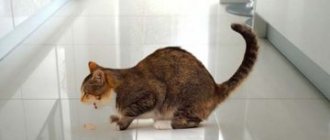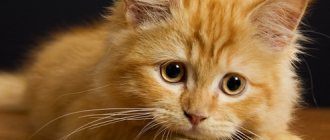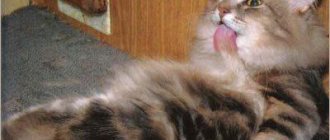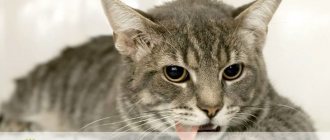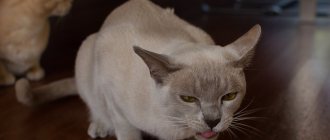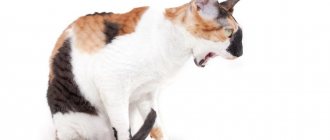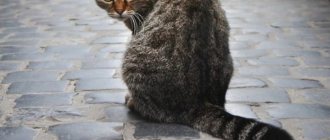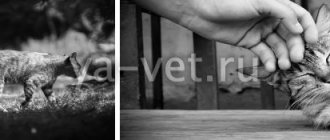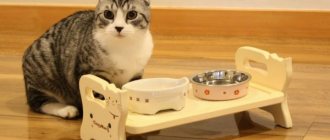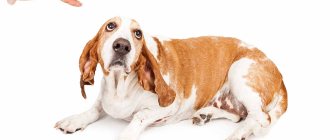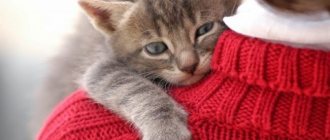We are accustomed to associate any digestive problems with food eaten shortly before. And if a cat vomits after dry food, the owner involuntarily begins to doubt the correctness of the selected diet. In fact, one-time vomiting in the absence of other symptoms is not a cause for alarm and can be caused by a variety of reasons.
Do not rush to switch your pet to another brand of food, especially to a different type of food. Some factors that provoke vomiting can be easily eliminated without radical changes in the menu.
What could be the causes of vomiting?
The following reasons are possible if a cat vomits undigested food.
Haste when eating
A cat vomits fur every day: what to do?
Due to habit, cats may eat hastily but drink little. Lack of fluid in the body leads to vomiting. In this case, add a little water to the food. But you shouldn’t wait for the granules to swell, as the cat may not even like such a treat.
Note! Food diluted with water will swell greatly in the stomach. Therefore, standard portions need to be slightly reduced.
Binge eating
Can a cat vomit after eating dry food? Cats do not have a stopcock that will stop them when their stomach is full. They will eat as much as is in the bowl. When overeating, the pet’s stomach does not have time to stretch to accommodate the incoming volumes of food and gets rid of the excess in a simple way.
This phenomenon is especially often observed among owners of several pets, between whom there is a fight for food. Everyone tries to snatch a bigger piece for themselves and no longer cares about the amount of food.
Important! After vomiting, the cat may ask for food again. In this case, it is necessary to limit food intake. It is important that your pet chews the food and not swallows it.
Poor quality diet
If a cat is kept on economy class or cheap food, vomiting is a completely predictable phenomenon. To assimilate the food received, the animal’s body must have enough complete protein. If a cat vomits food, the reason may lie in the lack of this particular element. Cheap food contains very little meat; it is replaced with offal. Also, the preservatives and additives included in the food negatively affect the stomach, causing vomiting.
Important! You should not keep your pet on dry food all year round; it also needs natural food. Food waste from the table is not considered a natural product, since some of it can cause even greater harm to the pet.
Component intolerance
Why does a cat vomit after dry food? She may have allergies or intolerance to the components of the food, especially if it is cheap. Wheat or corn is added to many of these foods.
Vomiting can also be caused by a change in diet, so the body gets used to new foods.
Vomiting: its causes and dangers
Most often, vomiting is a sign of disturbances in the gastrointestinal tract. However, there are several reasons when the urge occurs against the background of other body processes. For example, during pregnancy, a cat’s internal organs are compressed, and the stomach cannot accommodate the usual amount of food. Another reason why a pregnant cat vomits is toxicosis. But this does not mean at all that she was not poisoned or her gastritis did not worsen.
Sometimes owners are perplexed why a healthy and active cat vomits food. Urging often occurs due to stress, especially if some kind of shock has occurred in the animal’s life.
Parasites are another reason why your cat vomits yellow mucus. Only a consultation with a veterinarian will help you cope with worms.
Binge eating
If the owner neglects the recommendations of the food manufacturer regarding feeding standards, then the cause of vomiting in the cat is overeating. Dry food seems light to owners, which means that a lot of granules are required to satiate the pet.
Once in the stomach, the particles swell, causing heaviness in the stomach. To avoid this, the owner should adhere to dosages and not exceed the daily allowance.
The cat eats too fast
If an animal swallows dry granules too quickly, it begins to vomit. This behavior is caused by competition that arises from living with another pet in the same house.
If your pet eats food without chewing, then you should start feeding it in another room, separate from other cats. You can also solve the problem by purchasing a bowl with ridges that slow down the absorption of food.
Abrupt change of feed
If a cat vomits after a new dry food, then it is possible that the matter is due to a sudden change in manufacturer. The new diet should be introduced gradually, mixing it with the usual food over the course of a week.
Vomiting may occur due to different compositions. For example, if the previous food contained mainly cereals, and the new food contained meat products. In this case, the body needs time to absorb the new type of protein.
Dry food is expired or spoiled
If your pet is vomiting daily, you should check the expiration date of the food on the packaging. If the date corresponds to the norm, it means that the food has spoiled for other reasons.
Dry rations often spoil due to poor storage conditions. The unsuitability of pellets for feeding is indicated by a sour smell and the presence of mold. In this case, it is easier to throw away the packaging and buy a new one. Before purchasing, you should always check the expiration date and integrity of the packaging.
The food is not suitable for the animal
Situations often arise when high-quality food is not suitable for a pet, causing food intolerance. Vomiting and diarrhea indicate this.
Most often, vomiting is provoked not by the food itself, but by the ingredients included in its composition. As a rule, these are sources of protein. Having selected a diet that does not contain the problematic component, the owner will be able to continue feeding the animal dry food.
The cat ate the food together with another product
Sometimes a pet refuses to eat food, so owners mix it with natural products. Different foods are digested differently. For example, an acidic environment is required to break down meat, which cannot be said about digesting a dry diet in which the proteins are denatured.
Mixing components that are incompatible with each other stops the stomach from working. The body begins to get rid of undigested food, vomiting occurs.
Hairballs in the stomach
Hairballs stuck in the stomach cause vomiting. When a pet is hungry, he does not feel discomfort, but as soon as he has lunch, his stomach cramps. Lumps prevent food from being digested normally, so the body tries to get rid of them.
Similar problems often occur in cats of long-haired breeds. Sometimes animals try to induce vomiting on their own by chewing plastic bags.
Causes: illness or poisoning
Vomiting after eating in a cat can occur due to poisoning or illness. To find out the cause, the cat's owner must take it to a veterinarian, who will prescribe tests and an ultrasound of the gastrointestinal tract.
Diseases that cause vomiting in cats:
- colitis;
- gastritis;
- ulcer;
- pancreatitis.
Inflammatory processes in the intestines also adversely affect the functioning of the gastrointestinal tract. To avoid vomiting from poisoning, your pet's food and water should be fresh, and access to the trash can should be closed. It is advisable to purchase and plant catnip grass on the windowsill. It stimulates digestion and has bactericidal properties.
Before taking your cat to the doctor, it is worth considering whether the vomiting is caused by parasites. Worms interfere with digestion, so owners must provide quarterly anthelmintic prophylaxis for the animal.
What symptoms require you to go to the clinic?
If the cat vomits food once, it is too early to panic. You should pay attention to the pet’s condition: whether its eyes are shiny, whether its nose is cold, what mood it is in - lethargic or active. Perhaps everything is fine with your health, but vomiting is caused by overeating.
How much dry food does a cat need per day: table
If a cat vomits food regularly, it is accompanied by poor health and impurities of blood or bile in the rejected masses, the animal should be taken to a doctor for examination. Especially if the vomit is yellow or green.
If this cannot be done in the near future, you should provide first aid yourself. It consists of limited consumption of water and food: the latter is fed in small pieces every 2 hours. Only easily digestible foods are suitable: boiled chicken, cottage cheese or baby food.
Important! Don't put off going to the clinic. Regular vomiting can be a signal of dangerous diseases.
Urgent medical attention is required if:
- vomiting continues for more than a day;
- the pet refuses food and water;
- the rejected masses contain admixtures of mucus or blood;
- The cat’s well-being and mobility deteriorate.
Binge eating
What can vomiting look like after eating?
Vomiting after eating is not always a disease; it can be a sign of a one-time cleansing for physiological reasons. By its appearance and consistency, you can determine the reason that caused the stomach to reject food. If a cat vomits after eating undigested food, it is necessary to examine the vomit and, if any signs are suspicious, contact a veterinarian.
Undigested food
If a cat vomits after eating undigested food, this means that the pet was overfed or he ate too quickly. The stomach is unable to process large pieces that are swallowed greedily, which is where problems arise.
Owners should take into account that a single case of vomiting does not pose a threat to the health of the animal, however, if it occurs repeatedly, it is necessary to make an appointment with a doctor. One of the reasons for constant vomiting of undigested food may be a malfunction of the pancreas or problems with the stomach itself.
With hairballs
Cat breeds with long, thick hair may well suffer from hairball vomiting (trichobezoars). While licking, the pet swallows fur, it accumulates in the stomach and causes discomfort. Large hairballs irritate the mucous membranes of the stomach walls, the so-called tickling. Trichobezoars interfere with normal digestion of food and, as a result, cause vomiting.
If wool is constantly swallowed by an animal, it clogs the stomach or intestines itself - this requires urgent treatment, as it can be fatal. Special pastes or herbs will help prevent trouble - when eating it, the cat feels nauseous. Vomiting removes the fur from the body, and it continues to function normally.
With bile or foam
Sometimes a cat vomits after eating with bile or foam. It is necessary to distinguish between these two options.
If you vomit with bile, you may suspect problems with the gallbladder or liver function. In exceptional cases, vomit may have traces of white foam. There is no need to waste time, but urgently take the cat to the hospital - he is in pain, unwell, and without treatment he may die.
Vomiting with white foam most often symbolizes that the cat is hungry. If an animal has not eaten for a long time and then swallows a large amount of food, there is a high probability of nausea from undigested food covered in white foam.
In case of regular repetitions of foamy or yellow vomiting, it is necessary to take the cat to the doctor and have it examined.
What to do if your cat vomits after eating undigested food
A cat vomits food once - this is an incident that is unlikely to pose a threat. Repeated situations require medical intervention.
Feed your cat more often, but with less food
The volume of a cat's stomach is small. Rather than overloading it with huge portions 1-2 times a day, it is better to feed it 4-5 times a day in small portions. This way the pet will be full and not overeat.
What to feed the cat in this case
What to feed a cat after vomiting? Switching to other dry foods will not always bring results, and may even worsen them. A sick pet is gradually fed with natural products: boiled chicken, cottage cheese, baby food.
But you should not immediately switch the animal to natural products after low-quality semi-finished products, since a sudden change in diet will negatively affect the pet’s already poor health.
Doctor
Food intolerance
This condition develops due to the inability of the body's enzyme system to digest one or another component of dry food. As a rule, it occurs immediately upon a new diet and is accompanied not only by vomiting, but also by diarrhea. Is food intolerance a signal for an immediate diet change? Not always.
Very often, the pancreas simply needs time to adapt to the new diet and begin producing enzymes in the required quantities. For example, if your cat previously ate dry food with a low meat content for a long time, and now you decide to switch it to a diet with a large amount of meat ingredients, then naturally the stomach cannot digest it right away. That is why it is recommended to make the transition to a new diet gradually, gradually mixing the new food into the old diet and increasing its share every day until complete replacement.
In some cases, the process may be helped by taking enzyme preparations as prescribed by a veterinarian. You should also consult with him if the transition is carried out correctly, but the vomiting does not stop, in order to identify the component causing food intolerance and avoid it in the future.
Preventive measures
Compliance with preventive measures will avoid the problem of indigestion of food. What to do?
- The pet should always have access to clean water, especially if the diet is dry;
- You shouldn’t skimp on your pet’s health; its stomach needs high-quality nutrition. It is better to give him premium food;
- It is better to divide feeding into 4-5 times in small portions, so the cat will not overeat;
- worm your pet regularly, as worms and parasites also interfere with digestion;
- it is also necessary to choose the right food in accordance with the breed, age and condition of the pet;
- Be sure to regularly visit the veterinarian and carry out preventive vaccinations.
Important! You cannot give your pet medications or treatment on your own without a doctor’s recommendation. The owner may incorrectly determine the diagnosis, and attempts to save the pet will only hasten its death.
Natural product
If your cat vomits from food, you should get treatment as soon as possible. Rather than putting off going to the doctor or hoping that it “will go away on its own,” it is better to take measures as soon as possible so that the pet will delight its owner with its love and health for a long time.
When to see a doctor
The reasons why a cat may vomit undigested food are quite serious. The degree of danger of this symptom for the pet’s health is determined by the frequency of attacks, the content of vomit and general well-being. Signs such as rapid deterioration of the condition and refusal to eat should alert you. It is better to immediately take the animal to the clinic or call a veterinarian at home.
Emergency medical care is required in cases where:
- Vomiting continues for more than a day.
- The cat vomits after each feeding or independently of it several times a day.
- Vomit, along with pieces of undigested food, contains blood, mucus, bile, and other impurities not related to the food consumed.
- Loss of appetite. A particularly alarming symptom is when the animal refuses not only food, but also water.
- Restless behavior of the pet, desire for privacy, drooling, tearfulness.
The reasons for this condition of the cat can only be determined through a professional examination by a veterinarian. After conducting the necessary examination, he will establish a diagnosis and draw up a treatment plan.
Why does a cat vomit food?
I want to protect my beloved four-legged friend and help him when he feels ill. It often happens that after eating a cat vomits food. Before starting treatment, you need to figure out why this happened. There are several reasons:
- Binge eating;
- Unsuitable food;
- Disease of the gastrointestinal tract (GIT);
- Infection with helminths;
- Recently spayed or neutered;
- The presence of infection in the body of a furry friend;
- Change of diet;
- Pregnancy.
